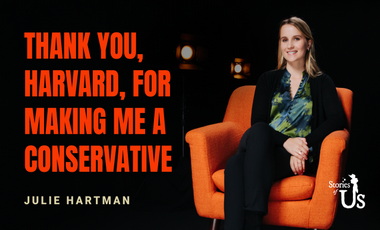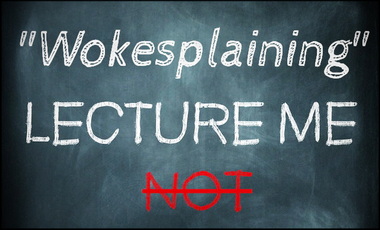Upon entering the halls of Harvard in 2018, Julie Hartman found herself going along with the leftist ideology invading academia. But that changed in the summer of 2020. Shocked by the anti-American sentiment and calls to “defund the police” among her classmates and in the media, Julie began to seek alternative points of view. After discovering PragerU and Dennis Prager, she was transformed and found her voice within the conservative movement.
Biased Education


Why Self-Esteem Is Self-Defeating (Myths of Psychology)
(Originally posted Sept 2017, updated Aug 2023)
- “There is no correlation between goodness and high self-esteem. But there is a correlation between criminality and high self-esteem. … Yes, people with high self-esteem are the ones most prone to violence.”
Is having high self-esteem key to happiness? That’s what children are told. But is it true? Or can that advice be doing more harm than good? Author and columnist Matt Walsh explains.
I am updating the original “simple” post with the below. What is the below? It is an expansion of the idea of Self-Esteem and the powers the Lefty educators try to embed in it’s fruits and goals/meaning. As with anything the Left touches, it destroys [speaking here of education], they also distort meaning of words and concepts beyond their useful parlance and application. What follows are forum discussions for an accelerated Masters degree in Education. (A friend had to go on a baseball trip with the high school team and had to take a break from his studies. I filled in.) While class was on “multicultural literature for the classroom,” in the class discussion forum there was a discussion on self-esteem which I jumped in to.
I posted the following knowing I would be the only person with ideas like this — “evolved” further along the thought process with resources foreign to most in the field chasing a degree. I will add two responses I got with added thoughts and resources for my readers. For Context, THIS PDF was one of my papers for this class… it was during the writing of this paper that “self-esteem” was being discussed.
SELF-ESTEEM
I have heard (read) a few here mention the importance of self-esteem. In studies done on inmates (drug-dealers and rapists), self-esteem was high.
I think we as educators should be careful not to try and build self-esteem. First, we do not have the right credentials to know or diagnose true self-esteem. Secondly, the type that seems to pervade definitions today is the type that hinders the kids in academics. I read an interesting book some years ago, and I would suggest everyone here gets it at some point during his or her journey to teach, and teach well. The book is entitled The Conspiracy of Ignorance: The Failure of American Public Schools, by Martin Gross. I wish to quote a bit from a section on self-esteem:
- “A large group of eager American 8th graders from two hundred schools coast-to-coast were excited about pitting their math skills against youngsters from several other nations.
- “The math bee included 24,000 thirteen-year-olds from America, South Korea, the United Kingdom, Spain, Ireland, and four Canadian provinces, all chosen at random and given the same 63-question exam in their native language.
- “It was a formidable contest, and the American kids felt primed and ready to show off their mathematical stuff. In addition to the math queries, all the students were asked to fill out a yes-no response to the simple statement “I am good at math.”
- “With typical American confidence, even bravado, our kids responded as their teachers would have hoped. Buoyed up by the constant ego building in school, two-thirds of the American kids answered yes. The emphasis on “self-esteem” – which permeates American schoolhouses – was apparently ready to pay off.
- “Meanwhile, one of their adversaries, the South Korean youngsters, were more guarded about their skills, perhaps to the point where their self-esteem was jeopardized. Only one-fourth of these young math students answered yes to the same query on competence.
- “Then the test began in earnest. Many of the questions were quite simple, even for 8th graders. One multiple-choice query asked: ‘here are the ages of five children: 13, 8, 6, 4, 4. What is the average age of these children?’ Even adults, long out of the classroom, would have no trouble with that one. You merely add up the numbers and divide by 5. The answer, and average age of 7, was one of the printed choices.
- “How did the confident American kids do on that no-brainer, on which we would expect a near-100 percent correct response? The result was ego-piercing. Sixty percent of our youngsters got it wrong.
- “When the overall test results came in, the Americans were shocked. Their team came in last, while the South Koreans won the contest. The most interesting equation was one of paradox. The math scores were in inverse ratio to the self-esteem responses. The Americans lost in math while they vanquished their opponents in self-confidence. The South Koreans, on the other hand, lost the esteem contest, but won the coveted math prize.” (pp.1-2)
An article by one of my favorite authors Paul Vitz, who is Professor Emeritus of Psychology, Department of Psychology, New York University and Adjunct Professor, John Paul II Institute for Marriage and Family, Washington, D.C. can be found at:
I hope this refocuses us to zero in on what truly makes a person (child) succeed.
- A 1989 study of mathematical skills compared students in eight different countries. American students ranked lowest in mathematical competence and Korean students ranked highest. But the researchers also asked students to rate how good they were at mathematics. The Americans ranked highest in self-judged mathematical ability, while the Koreans ranked lowest. Mathematical self-esteem had an inverse relation to mathematical accomplishment! This is certainly an example of a “feel-good” psychology, keeping students from an accurate perception of reality. The self-esteem theory predicts that only those who feel good about themselves will do well — which is supposedly why all students need self-esteem — but in fact feeling good about yourself may simply make you over-confident, narcissistic, and unable to work hard. (Paul Vitz)
I wish I had kept the original engagements written to me from Rachel, and Jodi. Unfortunately all I have are my responses — so context will be tough, but out of these responses and my additions there will be usable material for the religio-political apologist. First up is Rachel
Hi Rachel,
Did you read those articles I posted in my main post and other responses? What are your thoughts on those articles? I will give you another one to read that may address some of your worries about self-esteem. http://www.cyc-net.org/today2002/today020208.html (Trying to track down the article… will update when I find it.)
Unfortunately, you make my point when you say
- “What do these kids have high self esteem about? Living below poverty levels? Typically, being abandoned by one or both parents? Having society in general believe that they will never succeed at anything? Having the life expectancy of 21 either being in jail or dead?”
These items you mention have nothing to do with self-esteem.
Maybe, just maybe, is it possible that you have a distorted view of self-esteem? Or in the least, a distorted view of what builds healthy self-esteem?
I may be wrong on my position as well. But I have made a fifteen-year study of this on and off [as well as other accompanying issues], and I feel confident in saying I have a good grasp on the subject. Whereas most I meet haven’t heard about self-esteem as currently applied by educators as being harmful.
They merely defend the status quo or what they have accepted as the truth of the matter… without critically analyzing their own views on it. So I am use to — when presenting this to others — getting an immediate visceral response. When the person then goes and investigates the matter for themselves, usually their story changes over a year or two.
I want to give an example of two organizations, one that gives kids the proper tools to accomplish self-esteem for themselves and the other one who preaches defeat constantly. This can be exemplified in the dichotomy between what a commentator calls “victacrats,” like Rainbow/Push Coalition with the guiding hand of Rev. Jesse Jackson and that of BOND with the guiding hand of Rev. Jesse Lee Peterson. Two ways of dealing with one’s surroundings, one is optimistic (has hope and goals), one pessimistic (always trying to “keep hope alive,” because apparently it is always under attack).
Jordan Peterson – Self-esteem Doesn’t Exist
Here is an interaction with another gal, Jodi. I assume from the “quote marks” around “tolerant,” she was anything but.
Jodi,
I truly appreciate your boldness. It is refreshing, and “tolerant” (see my other post).
I want to post some quotes from another article, which I kindly ask any here to read, it is quite interesting. And tell me as you read this if this sounds like some of the more “hooligan” type kids on campus:
… But a spate of recent articles suggests that the tide may be turning. When Senator Robert Torricelli failed to admit wrongdoing as he resigned, Andrew Sullivan’s opinion piece in Time magazine (October 7, 2002) blamed “the sheer, blinding brightness of the man’s self-love” on the self-esteem movement. An article by Erica Goode in the New York Times (October 1, 2002) proclaimed that “‘D’ students . . . think as highly of themselves as valedictorians, and serial rapists are no more likely to ooze with insecurities than doctors or bank managers.” Worse, the writer said, some people with high self-esteem are likely to respond with aggression if anyone dares to criticize them: “Neo-Nazis, street toughs, school bullies . . . combine preening self-satisfaction with violence.”
In the pages of the New York Times Magazine (February 3, 2002), psychologist Lauren Slater maintained that the self-esteem movement has produced a “discourse of affirmation” that ladles out praise regardless of achievement. She concluded that self-appraisal and self-control need to take the place of self-esteem in psychotherapy. In the Christian Science Monitor (October 24, 2002), conservative commentator Dinesh D’Souza said of self-esteem that “unlike honor, it does not have to be earned.”
Most such media critiques draw on the well-publicized research findings of the same three social psychologists: Roy Baumeister, Jennifer Crocker, and Nicholas Emler. But, as we shall see, these psychologists rely on mistaken conceptions of self-esteem and on flawed research methods.
PSYCHOLOGISTS AGAINST SELF-ESTEEM
Roy Baumeister, a professor of psychology at Case Western Reserve University, is the academic psychologist best known for claiming that “D” students, gang leaders, racists, murderers, and rapists have high self-esteem. Examining empirical studies on how murderers and rapists respond to self-defining statements, Baumeister and his colleagues have pointed out that these individuals consciously believe they are superior, not inferior—a belief that, Baumeister says, is characteristic of high self-esteem.
Baumeister does not claim that high self-esteem necessarily leads to aggression; in order to do so, it must be combined with an ego threat (a challenge to one’s high self-appraisal). In a study that has gotten less media attention, Baumeister and Brad Bushman tested this hypothesis experimentally. Participants were given the Narcissistic Personality Inventory, which contains such items as “If I ruled the world it would be a much nicer place,” and the Rosenberg Self-Esteem Scale. (See below for more about these questionnaires.) The ego threat was a strong criticism of the participant’s intellectual competence. Participants were given the opportunity to aggress against the people who had criticized them, by delivering a blast of noxious noise. (Since this was a social psychology experiment, the noise was not really delivered to the critic.) What the results showed was that the narcissism measure, not the self-esteem score, predicted the strength of the aggressive response (the intensity and duration of the noise). But because those who scored high on the narcissism questionnaire also tended to score high on the self-esteem scale, it looked as though some people with “high” self-esteem are aggressive when their sense of self is threatened.
The research of Jennifer Crocker, a professor of psychology at the University of Michigan, has indicated that deriving one’s self-esteem from certain “external” contingencies, such as appearance, is associated with potentially destructive behavior, including alcohol and drug use, and eating disorders. Crocker and her colleagues conducted a study with applicants to graduate programs who based their self-esteem on academic competence. They found that such students showed greater increases in self-esteem on days of acceptance and greater decreases on days of rejection. The stability of self-esteem is an important area of investigation because several studies have found that people whose self-esteem is unstable (that is, fluctuates substantially on a daily basis) are more emotionally reactive to everyday events. They are more likely to become depressed when confronted with daily hassles and are more prone to anger when their self-esteem is threatened.
Crocker’s findings have led her to conclude that the pursuit of self-esteem has significant costs. Crocker has gone on to contend that self-esteem ought to be non-contingent: not based on any source at all. If people value themselves positively without conditions or criteria, Crocker maintains, they will be less likely to suffer from problem drinking, maladaptive hostile reactions, and depression.
Nicholas Emler, a psychologist at the University of Surrey, is a researcher whose work has garnered extensive media attention in Great Britain. He also believes that high self-esteem is a source of trouble. His 2001 monograph Self-Esteem: The Costs and Causes of Low Self-Worthreviews a wide range of published research, concluding that low self-esteem is not a risk factor for delinquency, violence against others, or racial prejudice. On the contrary, he suggests, high self-esteem is the more plausible risk factor. Relying on Baumeister’s and Crocker’s evidence about the pitfalls of self-esteem, as well as other research, Emler asserts that people with high self-esteem are more likely to engage in risky pursuits, such as driving too fast and driving drunk. Lastly, Emler finds little evidence that self-esteem and educational attainment are associated, since even failing students can show high self-esteem on questionnaires. …
Does any of that ring true to you… just a bit? And the question then becomes Jodi, do you have a degree that gives you the tools to delineate between proper (i.e., earned) self-esteem and narcissism?
I don’t, and when I look into who writes the textbooks and teacher resources on this matter, they do not either. Instead, they merely accept the latest fad, like outcome-based education. When I deal with other people’s kids I do not bet their kids to pop-psychology. And I let their parents know that I don’t.
Thank you again for the thoughtful challenge.
I was trying to be as gracious as I could.
Parents want to do all they can to help their kids become happy, independent adults, but the question is, how do we do that? For the last 30 years, parents have heard that instilling “high self-esteem” is the secret to raising successful children. But the research does not support that. In fact, the quality of ‘high self-control’ is emerging as the most important trait. This talk by Heidi Landes, parent coach and mother of 4, looks at the research around these concepts, as well as giving parents simple ways to encourage their children to develop greater self-control, and a greater chance of success in adulthood.
Heidi Landes is a parent coach who started a coaching business called Courage for Parents with her husband, Gabe. Their mission is to help parents prepare their children for life. They also serve as a host family for medical mission children from Africa and travel with their family to Mexico several times a year to volunteer at an orphanage. Heidi received an undergraduate degree from Miami University and a MBA from the University of Dayton. Early in her career, she founded TeenWorks, Inc., a faith-based nonprofit that taught entrepreneurialism to youth, and served on the board of Her Star Scholars, an organization that sends young girls to school in underdeveloped countries. Heidi and her husband live in Dayton with their four children.
Dr. Paul Vitz notes the end result of what Dr. Baumeister confirms:
…Finally, the whole focus on ourselves feeds unrealistic self love. What psychologists often call narcissism. One would have thought America had enough trouble with narcissism in the 70s which was the Me Generation and in the 80s with the yuppies. Today, the search for self-esteem is just the newest expression of America’s old egomania.
In giving school children happy faces for all their homework just because it was handed in or giving them trophies for just being on the team is flattery of the kind found for decades in our commercial slogans “You deserve a break today,” “You are the boss,” “Have it your way.” Such self love is an extreme expression of an individualistic psychology long supported by our consumer world. Now, it is reinforced by educators who gratify the vanity of even our youngest children with repetitive mantras like “You are the most important person in the whole world.”
This narcissistic emphasis in American society and especially in education and to some extent in religion is a disguised form of self worship. If accepted, America would have 250 million “most important persons in the whole world.” Two hundred and fifty million golden selves. If such idolatry were not socially so dangerous, it would be embarrassing, even pathetic. Let’s hope common sense makes something of a come back…..
Here is more… a “for instance” via PSYCHOLOGY TODAY in an article notes the following:
As a culture, we are highly concerned with self-esteem. And this is a good thing. How we feel about ourselves determines how we treat those around us and vice versa. In 1890, William James identified self-esteem as a fundamental human need, no less essential for survival than emotions such as anger and fear. And yet, we often fail to measure the many distinctions between self-esteem and vanity, or we fail to understand how our actions and reactions can serve to bolster one as opposed to the other.
Terror management theorist Dr. Sheldon Solomon makes the point that self-esteem is “controversial as some claim that it is vitally important for psychological and interpersonal well-being, while others insist that self-esteem is unimportant or is associated with increased violence and social insensitivity.” He goes on to say that “those who claim that high self-esteem is problematic and associated with increased aggression are either willfully or unwittingly confusing and [equating] self-esteem with narcissism.”
The distinction between self-esteem and narcissism is of great significance on a personal and societal level. Self-esteem differs from narcissism in that it represents an attitude built on accomplishments we’ve mastered, values we’ve adhered to, and care we’ve shown toward others. Narcissism, conversely, is often based on a fear of failure or weakness, a focus on one’s self, an unhealthy drive to be seen as the best, and a deep-seated insecurity and underlying feeling of inadequacy. So where do these attitudes come from? And why do we form them?
[….]
Studies have shown that children offered compliments for skills they haven’t mastered or talents they do not possess are left feeling as if they’d received no praise at all, often even emptier and less secure. Only children praised for real accomplishments were able to build self-esteem. The others were left to develop something far less desirable–narcissism. Unnatural pressure or unearned buildup can lead to increased insecurities and anxieties that foster narcissism over self-confidence.
THE GUARDIAN expands on the emptiness of this modern educational push and the miapplication of it:
A widespread view among teachers and social workers that delinquency, violence and under-achievement can be blamed on people’s low self-esteem is debunked today in research commissioned by the Joseph Rowntree Foundation.
Nicholas Emler, a social psychologist at the London School of Economics, claims to have exploded the myth that a limited sense of self-worth lies behind just about every personal and social ill – from drug abuse and racism to poverty and business failure.
“Widespread belief in ‘raising self-esteem’ as a cure for social problems has created a huge market for self-help manuals and educational programmes that threatens to become the psychotherapeutic equivalent of snake oil,” he says. “Unfortunately, many of the claims made about self-esteem are not rooted in hard evidence.”
Individuals with an unjustifiably high opinion of themselves often pose a greater threat to those around them than do people whose sense of self-worth is unusually low, Emler argues.
The research, Self-esteem: The Costs and Causes, is based on analysis of studies of children and young people, linking measurement of their self-esteem to their subsequent behaviour. Emler found relatively low self-esteem did not lead people into delinquency, violence (including child and partner abuse), drug use, alcohol abuse, educational under-attainment or racism.
On the other hand, young people with very high self-esteem were more likely than others to hold racist attitudes, reject social pressures from adults and peers and engage in physically risky pursuits, such as drink-driving or driving too fast.
The research identified a few areas where low self-esteem could be a risk factor. It made people more liable to suicide, depression, teenage pregnancy and victimisation by bullies. But in each case a low sense of self-worth was only one of several risk factors.
Emler found that parents had the most influence on young people’s level of self-esteem – both through genetic inheritance and upbringing. The effects of high or low achievement at school were relatively small.
All of this is of course rooted in Abraham Maslow’s “Hierarchy of Needs,” Carl Rogers’ Self-Image, or John Dewey’s “Whole Person. The progressive, humanistic endeavors give zero tools to the educator to distinguish between narcissism and a healthy value based and merit based self-esteem.
In this video I provide a short introduction to the ideas of humanistic psychologists Abraham Maslow and Carl Rogers. Maslow and Rogers both emphasized the role of an intrinsic drive towards self-actualization, or fulfilling one’s greatest potential, in shaping an individual.
What is Secular Humanism? Most teachers end up being engrained with this reductionistic religion, whether they realize it or not:
Secular Humanism is a well-articulated worldview. This is evident from the three Humanist Manifestos written in 1933 and revised in 1973 and again in 2000. According to their own pronouncements, Secular Humanists are atheists who believe that the scientific method is the primary way we can know about life and living, from understanding who we are as humans to questions of ethics, social issues, and politics.
However, apart from the specifics of what Secular Humanists believe, the pressing issue is this: is Secular Humanism a religion? This is important in light of current discussions surrounding the idea of “separation of church and state.” That’s because this phrase has been used by the courts and secular organizations (such as American’s United Against Church and State) in an attempt to eradicate all mention of God from the public square, including public debates over social issues, discussions in politics, and especially regarding what is taught in public/government schools.
To verify that a number of major tenets of Secular Humanism are taught in public schools, one only needs to compare Secular Humanist beliefs with what is actually being presented through public school textbooks. For example, any text on psychology includes what are considered the primary voices in that field: Abraham Maslow, Eric Fromm, Carl Rogers, and B. F. Skinner, to name a few. Yet, each of these men are atheists who have been selected as “Humanist of the Year” by a major Secular Humanist organization. So why are almost all the psychologists studied in school Secular Humanists? Why are no Christian psychologists included in the curriculum? Is this balanced treatment of the subject matter being taught?
Or when it comes to law, why are the Ten Commandments, historically known to be the foundation for English Common Law and American jurisprudence, judged to be inappropriate material to be hung on the school wall, in a courtroom, or as part of a public display on government property? The answer, of course, is an appeal to the “separation” principle.
But if this is how the courts are going to interpret the separation principle, we must insist that this ruling be applied equally to all religious faiths, not favoring some others. Therefore, for the sake of fairness under the law, if Secular Humanism is a religious faith, too, then teaching the tenets of this religious faith must also be eliminated from public school textbooks and classroom discussions. …..
And SUMMIT has more on sel-esteem worth reading:
Historically, the concept of self-esteem has no clear intellectual origins; no major theorist has made it a central concept. Many psychologists have emphasized the self, in various ways, but the usual focus has been on self-actualization, or fulfillment of one’s total potential. As a result, it is difficult to trace the source of this emphasis on self-esteem. Apparently, this widespread preoccupation is a distillation of the general concern with the self — found in many psychological theories. Self-esteem seems to be the common denominator pervading the writings of such varied theorists as Carl Rogers, Abraham Maslow, “ego-strength” psychologists, and various recent moral educators. In any case, the concern with self-esteem hovers everywhere in America today. It is, however, most reliably found in the world of education — from professors of education to principals, teachers, school boards, and television programs concerned with preschool children.
Self worth, a feeling of respect and confidence in one’s being, has merit, as we shall see. But an ego-centered, “let me feel good” self-esteem can ignore our failures and need for God.
What is wrong with the concept of self-esteem? Lots — and it is fundamental in nature. There have been thousands of psychological studies on self-esteem. Often the term self-esteem is muddled in confusion as it becomes a label for such various aspects as self-image, self-acceptance, self worth, self-trust, or self-love. The bottom line is that no agreed-upon definition or agreed-upon measure of self-esteem exists, and whatever it is, no reliable evidence supports self-esteem scores meaning much at all anyway. There is no evidence that high self-esteem reliably causes anything — indeed lots of people with little of it have achieved a great deal in one dimension or another.
For instance, Gloria Steinem, who has written a number of books and been a major leader of the feminist movement, recently revealed in a book-long statement that she suffers from low self-esteem. And many people with high self-esteem are happy just being rich, beautiful, or socially connected. Some other people whose high self-esteem has been noted are inner-city drug dealers, who generally feel quite good about themselves: after all, they have succeeded in making a lot of money in a hostile and competitive environment.
A 1989 study of mathematical skills compared students in eight different countries. American students ranked lowest in mathematical competence and Korean students ranked highest. But the researchers also asked students to rate how good they were at mathematics. The Americans ranked highest in self-judged mathematical ability, while the Koreans ranked lowest. Mathematical self-esteem had an inverse relation to mathematical accomplishment! This is certainly an example of a “feel-good” psychology, keeping students from an accurate perception of reality. The self-esteem theory predicts that only those who feel good about themselves will do well — which is supposedly why all students need self-esteem — but in fact feeling good about yourself may simply make you over-confident, narcissistic, and unable to work hard.
I am not implying that high self-esteem is always negatively related to accomplishment. Rather, the research mentioned above shows that measures of self-esteem have no reliable relationship to behavior, either positive or negative. In part, this is simply because life is too complicated for so simple a notion to be of much use. But we should expect this failure in advance. We all know, and know of, people who are motivated by insecurities and self-doubts. These are often both the heroes and the villains of history. The prevalence of certain men of small stature in the history of fanatical military leadership is well-documented: Julius Caesar, Napoleon, Hitler, and Stalin were all small men determined to prove they were “big.” Many great athletes and others have had to overcome grave physical disabilities and a lack of self-esteem. Many superior achievements appear to have their origin in what psychologist Alfred Adler called “inferiority completes.”
The point is not that feeling bad about ourselves is good, but rather that only two things can truly change how we feel about ourselves: real accomplishment and developing “basic trust.” First, real accomplishment in the real world affects our attitudes. A child who learns to read, who can do mathematics, who can play the piano or baseball, will have a genuine sense of accomplishment and an appropriate sense of self-esteem. Schools that fail to teach reading, writing, and arithmetic corrupt the proper understanding of self-esteem. Educators who say, “Don’t grade them, don’t label them. You have to make them feel good about themselves,” cause the problems. It makes no sense for students to be full of self-esteem if they have learned nothing. Reality will soon puncture their illusions, and they will have to face two disturbing facts: that they are ignorant, and that the adults responsible for teaching them have lied to them. In the real world praise has to be the reward for something worthwhile: praise must be connected to reality.
There is an even more fundamental way in which most people come to genuine self-esteem — actually, to feelings of self-worth and what psychologists call “basic trust.” Such feelings come through receiving love; first of all, our mother’s love. But this foundational experience of love and self-confidence cannot be faked. When teachers attempt to create this deep and motivating emotion by pretending they “love” all their students and by praising them indiscriminately, they misunderstand the nature of this kind of love. Parental love simply cannot be manufactured by a teacher in a few minutes of interaction a day for each of thirty or more students. The child not only knows that such love is “fake,” but that real teachers are supposed to teach, and that this involves not just support but discipline, demands, and reprimands. Good teachers show their love by caring enough to use discipline. Thus, the best, most admired teachers in our high schools today often are the athletic coaches. They still teach, but they expect performance, and they rarely worry about self-esteem.
Similar problems arise for those who try to build their own flagging self-esteem by speaking lovingly to their “inner child” — or other insecure inner selves. Such attempts are doomed to failure for two reasons: first, if we are insecure about our self-worth, how can we believe our own praise? And second, like the child, we know the need for self-discipline and accomplishment.
Self-esteem should be understood as a response, not a cause. It is primarily an emotional response to what we and what others have done to us. Though it is a desirable feeling or internal state, like happiness it does not cause much. Also, like happiness, and like love, self-esteem is almost impossible to get by trying to get it. Try to get self-esteem and you will fail. But do good to others and accomplish something for yourself, and you will have all you need.
The subject is vital for Christians, partly because so many are so concerned about it and partly because the recovery of self-esteem has been touted as tantamount to a new reformation. We must note, however, that self-esteem is a deeply secular concept — not one with which Christians should be particularly involved. Nor need they be. Christians should have a tremendous sense of self-worth: God made us in His image, He loves us, He sent His Son to save each of us; our destiny is to be with Him forever. Each of us is of such value that the angels rejoice over every repentant sinner. But on the other hand, we have nothing on our own to be proud of, we were given life along with all our talents, and we are all poor sinners. There is certainly no theological reason to believe that the rich or the successful or the high in self-esteem are more favored by God and more likely to reach heaven, indeed there is far more evidence to the contrary: “Blessed are the meek.”
In addition, self-esteem is based on the very American notion that each of us is responsible for our own happiness. Thus, within a Christian framework, self-esteem has a subtle, pathological aspect: we may take the “pursuit of happiness” as a far more intense personal goal than the pursuit of holiness. Today self-esteem has become very important because it is thought to be essential to happiness: unless you love yourself, you will not be happy. But to assume that we must love ourselves, that God will not love us as much as we need to be loved, is a form of practical atheism. We say we believe in God, but we don’t trust Him. Instead, many Christians live by the very unbiblical “God loves those who love themselves.”
Another problem is that Christians have begun to excuse evil or destructive behavior on the grounds of “low self-esteem.” But self-esteem, whether high or low, does not determine our actions. We are accountable for them and we are responsible for trying to do good and avoid evil. Low self-esteem does not make someone an alcoholic, nor does it enable a person finally to admit his or her addiction and do something about it. Both of these decisions are up to each of us regardless of one’s level of self-esteem.
Finally, the whole focus on ourselves feeds unrealistic self-love, which psychologists often call “narcissism.” One would have thought America had enough trouble with narcissism in the seventies with the “Me Generation,” and in the eighties with the Yuppies. But today’s search for self-esteem is just the newest expression of America’s old egomania. And giving schoolchildren happy faces on all their homework just because it was handed in or giving them trophies for just being on the team is flattery of the kind found for decades in our commercial slogans: “You deserve a break today”; “You are the boss”; and “Have it your way.” Such self-love is an extreme expression of an individualistic psychology long supported by consumerism. Now it is reinforced by educators who gratify the vanity of even our youngest children with repetitive mantras like “You are the most important person in the whole world.”
This narcissistic emphasis in our society, and especially in education and religion, is a disguised form of self-worship. If accepted, America would have 250 million “most important persons in the whole world,” 250 million golden selves. If such idolatry were not socially so dangerous, it would be embarrassing, even pathetic.

How Trans Activists Conquered American Life | Christopher Rufo
This is an upload from RUFO’S TWITTER. A new, powerful, concise video by investigative journalist Christopher Rufo exposes the monied interests, activist intellectuals and influential doctors behind the aggressive “trans” revolution in America. Rufo’s SUBSTACK IS HERE.

The Slippery Slope of the Subjective Left | Mark Goldblatt
Glenn Loury and John McWhorter talk with Mark Goldblatt about the mistaken epistemological premises of wokeism, which prioritizes subjective experience over objective fact.
The following is with a hat-tip to and an “adding to” Mark Goldblatt’s book, “I Feel, Therefore I Am: The Triumph of Woke Subjectivism“ (New York, N.Y.: Bombardier Books, 2022), 40-43. 
I will be adding links and graphics to the post… the graphic is linked to a larger one upon clicking it.
Why then do CRT advocates simultaneously reject the reality of racial categories yet embrace racial essentialism (a contradiction that would be deadly except in an avowedly postmodern movement)? Because they need to account for the failure of black people to measure up to non-black people in a number of statistically significant ways; they therefore need to argue that the criteria of measurement themselves reflect a bias against black people. To make that case, however, you must presuppose that black people are in some sense essentially distinct from non-black people. You must presuppose that, on a fundamental level, black people are wired differently.
Think about it. If black people are wired differently, you have a ready-made narrative of victimization. To take the most obvious example: you have a full explanation for why the scores of black kids lag behind others on standardized tests, and you have compelling proof of how past racism–in this case, the assumption of “white wiring” as the intellectual norm—continues to hold back black people.
The normalization of the way white minds work thus becomes a quintessential tool of white supremacy. That’s the premise behind the notorious “Whiteness” education portal sponsored by the Smithsonian’s National Museum of African American History and Culture. The original centerpiece of that portal was a chart (later withdrawn, after a public outcry) titled Aspects and Assumptions of Whiteness and White Culture. [RPT says see NATIONAL REVIEW, WASHINGTON TIMES, and the WASHINGTON EXAMINER for more.] What “aspects” and “assumptions” are we talking about? Here’s a partial list:
- Objective, rational, linear thinking
- Cause and effect relationships
- Quantitative emphasis
- Hard work is the key to success
- Work before play
- Heavy value on ownership of goods, space, property
- Plan for the future
- Delayed gratification
- The nuclear family: father, mother, 2.3 children is the ideal social unit
- Follow rigid time schedules
- Decision-making
- Written tradition
- Be polite
These, according to the Smithsonian’s National Museum of African American History and Culture, are essentially white things. Black people cannot be expected to adapt to them or value them in the same way white people do; it’s not in the nature of black people to do so.
Of course, the notion that black people are just different didn’t spontaneously evolve in the halls of the Smithsonian. It’s commonplace among critical race theorists. So, for example, we hear educational consultant and Columbia University Professor Maria Tope Akinyele explain:
Black people, we are relational people. We are people of context. Like, it’s very Western and European to dissect and analyze and take apart things, whereas [in] Afrocentric schooling or Afrocentric spirituality or African epistemology or ways of knowing, everything is connected. So this is why education is not working for so many students of color because we are context-driven people. We can’t tell a story without telling the ten things that happened that led up to that moment. There’s no such thing as like thinking in isolation—isolating yourself from nature, from your family. It’s just not part of our ways of knowing and being in the world. So when we tap into the ways that we understand the world, students are able to make wonderful connections and unleash their brilliance and their wisdom. (Black on Black Education)
Sounds like a straightforward endorsement of racial essentialism. Except twenty minutes later, in the same You Tube talk, she recounts a training session she held for a group of predominantly white instructors at which, “….about seventy percent of them did not know that race was a made-up thing. Like did not know! And I was like, ‘Who is teaching you?’ This is disrespect!”
CRT, again, has three legs: Collective grievance. Subjective historiography. And racial essentialism. The glue that holds it together is the postmodernist rejection of rationality as an arbiter of truth. Postmodernism is the reason it’s fruitless to point out that Professor Akinyele is contradicting herself. What possible difference would that make to her? What difference could it make within a CRT framework?
THOMAS SOWELL DEBUNKS LIES ABOUT BLACK EDUCATION
THE ORIGIN OF THE LEFT’S WAR ON WHITE PEOPLE IN AMERICA

Forcing Gender Affirmation In California (Animal Farm “Parenting”)
As the Daily Mail reported:
Under the revision to the Family Code, courts would be given complete authority to remove children from their homes if their parents do not affirm their gender.
The change would also make it so that schools, churches, and other organizations would need to affirm the gender identity of a child or face repercussions.
First, the schools confuse young minds, then, if those confused minds do not find celebration of their confusion at home, the state can take them. This is some Animal Farm crap!
Here is the DAILY SIGNAL’S story on it:
A recently amended California bill would add “affirming” the sexual transition of a child to the state’s standard for parental responsibility and child welfare—making any parent who doesn’t affirm transgenderism for their child guilty of abuse under California state law.
AB 957 passed California’s State Assembly on May 3, but a co-sponsor amended it after hours in California’s State Senate on June 6.
Assembly Member Lori Wilson, D-Suisun City, wrote the bill and introduced it on Feb. 14. State Sen. Scott Wiener, D-San Francisco, co-sponsored it. Wilson’s child identifies as transgender.
Originally, AB 957 required courts to consider whether a child’s parents were “gender-affirming” in custody cases. Wiener’s amendment completely rewrites California’s standard of child care.
AB 957 post-amendment “would include a parent’s affirmation of the child’s gender identity as part of the health, safety, and welfare of the child,” altering the definition and application of the entire California Family Code.
California courts would be given complete authority under Section 3011 of California’s Family Code to remove a child from his or her parents’ home if parents disapprove of LGBTQ+ ideology.
By changing the definition of what constitutes the “health, safety, and welfare of [a] child,” schools, churches, hospitals, and other organizations interacting with children would be required to affirm “gender transitions” in minors by default—or risk charges of child abuse.
AB 957 could also expand which organizations provide “evidence” of gender “nonaffirmation” to California’s courts.
Because of the addition of “gender affirmation” to the qualifications of California’s standards for “health, safety, and welfare,” California’s courts would now be able to accept reports of gender “abuse” from progressive activist organizations—as long as they claim to provide “services to victims of sexual assault or domestic violence.”
In essence, a boy could report his parents to his local school’s Gay-Straight Alliance club or other LGBTQ+ organization, who could then report the boy’s parents for child abuse.
Incredibly, the bill provides no definition whatsoever of what would qualify as “nonaffirming” to a child’s gender.
As Susannah Luthi of The Washington Free Beacon points out, “The bill makes no distinctions regarding the age of a child, how long a child has identified as transgender, or affirmation of social transition versus medical sex-change treatments.”…..

A Positive Way To Tackle “Gay Pride” In the Classroom
During a kid’s birthday party (a classmate of my niece) — the birthday boy’s father and I had a discussion partly spawned by my hat.
We discussed the current indoctrination push during “gay-pride” month, among other things. I discussed some of my past letters to the parents/teachers/and principles I had written when my boys attended school.
(5th Grade) Kwanzaa: Racism in Disguise
(6th Grade) Indians vs. Settlers – Letter from a Concerned Parent
(9th Grade) “Racism” Invoked in the Classroom
(My boys are 31 and 27 years of age now, so the indoctrination on all fronts has gotten worse for sure.)
He mentioned that it is bad, and I responded roughly like this:
Not the school his kids
go to, but nonetheless,
Craaazy!
- My boys are 31 and 27 years-old, but I wonder what I would do if they were in school right now. For instance, if my kid told me [or on a parent teacher night I saw] there was a gay-pride flag in the classroom. I think what I would do is offer the teacher a similar sized flag which I would buy her [almost always a “she” touting “equality”] to hang in the classroom as well. And is she refused to show equality of flags representing sexuality [which flags representing sexuality shouldn’t be allowed in the classroom, but that is neither here-nor-there], I would take the next step and discuss this with the principle. And if that met a dead end, the next step may be legal action. And by adding something to the “equality” stance, rather than asking them to take something down, I think would offer a more positive legal outcome.
When I mentioned this part of the conversation to my son he spoke like the teacher and said what would your response be to when she flatly refuses and says the flag is homophobic. To which I responded:
- If someone in the classroom refused to include the “heteronormativity flag” (straight pride) – and it got to that point where they didn’t want to put it up because of “bigotry” or “homophobia” – you would argue: Well, I’m, in fact, the one that wants both sides to be represented. I am not telling you to take something down or to put this one up exclusively, again, I’m the party who wants both sides to be represented. So if any “phobic” term is to be used, it’s “heterophobe” here in this conversation.
That was just one part of the convo with some dads and friends of dad at the birthday party. I thought that that solution to one of the many problems faced by parents of kids in state-schools is worthy to catalog here for others to say, “Oh yeah, I think that is something I can do in my little corner of the community.”
Two flags repping heteronormativity:
 |
 |

State Of Arizona Has Dropped All Charges Against Tim Tizon
- The state of Arizona has dropped all charges against former Arizona State University student Tim Tizon, the Liberty Justice Center recently confirmed to The College Fix. (COLLEGE FIX)

Brainwashing Sixth-Graders About Their Gender (Art Class Obfuscations)
(FOX NEWS) A Colorado mother said her daughter was among a group of sixth-graders recruited to a deceptive after-school “art” club that turned out to be much more than it seemed.
“When she got there, she very quickly learned it was actually a gender and sexuality awareness club,” Erin Lee told Fox News’ Harris Faulkner on Tuesday.
“The art teacher had invited in an outside presenter into the classroom that day, and this woman did absolutely unthinkable things with the kids.”
Lee explained that the guest presenter proceeded to use flags to describe “umbrella terms” and told the students they were transgender if they were not fully comfortable with their biological sex. The presenter also told students they could describe themselves as “queer” if they had not yet figured out their sexuality.
“She talked to them about polyamory. She told them that these new labels that they had just adopted made them more likely to commit suicide and talked to them extensively about suicide,” she continued.
The presenter also allegedly discussed puberty blockers and cross-sex hormones, warning those in attendance that their parents may not be “safe” people to turn to as they struggle with certain identities.
“She [the speaker] runs an organization called ‘Skittles’ for kids five to eleven to discuss gender and sexuality,” Lee said, noting that her daughter’s art teacher pulled her aside and told her “you don’t have to tell your parents.”
[….]
“These are taxpayer-funded teachers who are doing this,” she said. “And we want to send a nationwide message to these school systems, these parents and these school boards that parents govern their children, not these teachers, and we’re going to give them the tools that they need, our parents, to protect them against indoctrination and all of these crazy things that they’re doing.”…..

Black Mother Calls Out Democrats For Racially Brainwash Her Kids
Based Black Mother Calls Out White & Black Liberals For Trying To Racially Brainwash Her Kids
Black mother denounces ethnic studies curriculum in Minnesota: “I see why you white proponents of this bill might support it. It’s not your kids being told they can’t succeed and you get to shed some of your white guilt in the process.”pic.twitter.com/Ktkc7RFMes
— Christopher F. Rufo ⚔️ (@realchrisrufo) March 25, 2023

Yeonmi Park: My Terrifying Escape from North Korea (#Merica)
- I am most grateful for two things: that I was born in North Korea and that I escaped from North Korea. Both of these events shaped me, and I would not trade them for an ordinary and peaceful life. — Yeonmi Park
UPDATED VIDEO INTERVIEW: exactly one year from original posting
Yeonmi Park, North Korea defector and author on her defection from North Korea and how Columbia University has echoes of her past on ‘Kudlow.’
- Kudlow: “…somehow God was looking after you”
- Park: “Yes”
- Kudlow: “Really.”
- Park: “He did.”
- Kudlow: And, it’s a great story” [….] “It’s a blessing you made it through.”
Amen. (Concordia has a good posting on Yeonmi)
One commenter on the Fox Business’ YT channel says it all:
- I feel so embarrassed for our country when a foreign warrior comes here for freedom and still can’t escape the war.
Her accent is hard to follow, but you get a rhythm going as you listen to understand here | “GOD and North korea – Why the North Korean Christians Face the Most Extreme Persecution” (YouTube). She mentions the “real God” in the video speaking of the Judeo-Christian faith.
ORIGINAL POSTING
Born in North Korea, Yeonmi Park shares her harrowing journey to escape the hunger, thought control, and violence she experienced living under authoritarian regimes. Grateful to have found acceptance and justice in the United States, she cautions Americans to see the early warning signs—here in America—of the communist nightmares she fled in North Korea and China.

Virginia Magnet School Withheld National Merit Awards (#woke)
A top-ranked Virginia high school is accused of depriving students of National Merit awards because “they didn’t want to hurt the feelings of other students who weren’t being honored.”
More via ACE OF SPADES:
- “Top Virginia Math and Science Magnet School Refused to Tell Students They Were National Merit Finalists, Preventing Them From Putting That on Their College Applications, For the Sake of Racial ‘Equity'”
It’s Harrison Bergeron all the way down.
Virginia parents are outraged after a top-ranked high school allegedly delayed notifying students of national academic honors in the name of “equity,” making them unable to account for the recognition in some college applications.
Fairfax County parent Asra Nomani joined “Fox & Friends First” on Wednesday to discuss why the school delayed the awards and the importance of meritocracy in the classroom.
“This year the entire controversy just blew up because the kids got their certificate, weeks after early college application deadlines, just dropped on their desks as if it was just another piece of paper,” Nomani told co-host Todd Piro.
“And this amazing mom named Shawna Yashar started asking questions, just like every parent’s got to do,” she continued. “From issues of the drag queen story hours to indoctrination in the schools, this is another form of this race to the bottom that the schools are going through right now.”
Thomas Jefferson High School for Science and Technology (TJ) in Alexandria, Virginia, allegedly delayed academic awards for years, according to Nomani, because of its ploy to advocate “equal outcomes for every student, without exception.”
The school has even implemented a policy awarding students a 50% just for showing up to class, and administrators have eliminated zeroes entirely.
The delayed awards in question are given by the National Merit Scholarship Corporation, which recognizes top-performing high schoolers nationwide. TJ received the 2022 honors in October but did not distribute them to students until a month later, after early-application deadlines had passed, according to Nomani. Nomani’s son, a 2021 TJ graduate, was honored as a Commended Student in September 2020 but was never notified, she wrote in City Journal.
When Yashar, the mother who originally sounded the alarm on the school’s delay, brought the issue to the forefront, she was met with pushback from the school, Nomani said.
“The school wanted to recognize students as individuals, not their achievements, as if the two had to be separated,” she said.
Nomani wrote about this bizarre — and highly litigable — practice at City Journal.
For years, two administrators at Thomas Jefferson High School for Science and Technology (TJ) have been withholding notifications of National Merit awards from the school’s families, most of them Asian, thus denying students the right to use those awards to boost their college-admission prospects and earn scholarships. This episode has emerged amid the school district’s new strategy of “equal outcomes for every student, without exception.” School administrators, for instance, have implemented an “equitable grading” policy that eliminates zeros, gives students a grade of 50 percent just for showing up, and assigns a cryptic code of “NTI” for assignments not turned in. It’s a race to the bottom.
An intrepid Thomas Jefferson parent, Shawna Yashar, a lawyer, uncovered the withholding of National Merit awards. Since starting as a freshman at the school in September 2019, her son, who is part Arab American, studied statistical analysis, literature reviews, and college-level science late into the night. This workload was necessary to keep him up to speed with the advanced studies at TJ, which U.S. News & World Report ranks as America’s top school.
Last fall, along with about 1.5 million U.S. high school juniors, the Yashar teen took the PSAT, which determines whether a student qualifies as a prestigious National Merit scholar. When it came time to submit his college applications this fall, he didn’t have a National Merit honor to report–but it wasn’t because he hadn’t earned the award. The National Merit Scholarship Corporation, a nonprofit based in Evanston, Illinois, had recognized him as a Commended Student in the top 3 percent nationwide–one of about 50,000 students earning that distinction. Principals usually celebrate National Merit scholars with special breakfasts, award ceremonies, YouTube videos, press releases, and social media announcements.
But not at TJ. School officials had decided to withhold announcement of the award. Indeed, it turns out that the principal, Ann Bonitatibus, and the director of student services, Brandon Kosatka, have been withholding this information from families and the public for years, affecting the lives of at least 1,200 students over the principal’s tenure of five years. Recognition by National Merit opens the door to millions of dollars in college scholarships and 800 Special Scholarships from corporate sponsors.
I learned–two years after the fact–that National Merit had recognized my son, a graduate of TJ’s Class of 2021, as a Commended Student in a September 10, 2020, letter that National Merit sent to Bonitatibus. But the principal, who lobbied that fall to nix the school’s merit-based admission test to increase “diversity,” never told us about it. Parents from earlier years told me that she also didn’t tell them about any Commended Student awards. One former student said he learned he had won the award through a random email from the school to a school-district email account that students rarely check; the principal neither told his parents nor made a public announcement.
…
“Keeping these certificates from students is theft by the state,” says Yashar. Bonitatibus didn’t notify parents or the public. What’s more, it could be a civil rights violation, says local parent advocate Debra Tisler, with most TJ students in a protected class of “gifted” students, most of them racial minorities, many with disabilities, and most coming from immigrant families whose parents speak English as a second language….
In a call with Yashar, Kosatka admitted that the decision to withhold the information from parents and inform the students in a low-key way was intentional. “We want to recognize students for who they are as individuals, not focus on their achievements,” he told her, claiming that he and the principal didn’t want to “hurt” the feelings of students who didn’t get the award.
Sue them. Sue them personally, if possible.

The Sexualization of Children
Who should decide when and how to discuss issues like sex and gender with young children? Just a decade ago, this was thought to be the sole purview of parents. But that is no longer the case. Why is this shift happening, and who’s behind it? Karol Markowicz addresses these important questions.


